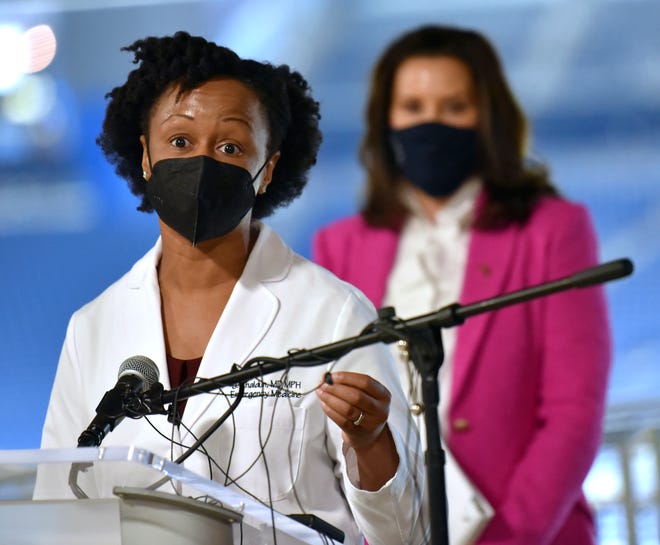Michigan's top doctor: There's 'certainly' a case for stronger health orders
 Craig Mauger
Craig MaugerLansing — Dr. Joneigh Khaldun, Michigan's chief medical executive, said Thursday there's "certainly" a case to be made for stronger restrictions amid surging COVID-19 infections, a day after Gov. Gretchen Whitmer laid out arguments against stricter limitations.
During an appearance on WDET's "Detroit Today," Khaldun avoided detailing specifically what advice she had given the Democratic governor but said that stronger restrictions are a "policy option" that "would be effective" if people followed them.
"But we also have … therapeutics now. We have vaccines now," Khaldun said at another point in the interview with host Stephen Henderson. "I don’t believe we need to do the type of restrictions that we did last April, just because we have learned so much more about this virus and we can be much more targeted and strategic in our efforts."

Khaldun referenced the fall surge when the Michigan Department of Health and Human Services suspended in-person high school classes and indoor dining at restaurants.
Michigan continues to lead the nation in new cases per population, a status the state has held for two weeks. Last week, there were 45,817 new infections reported in Michigan, a 19-week high. As of Wednesday, 3,998 adults were hospitalized with the virus, the second highest daily total the state has reported. The highest total, 4,011, came a day earlier.
Some public health experts — including Rochelle Walensky, director of the U.S. Centers for Disease Control and Prevention — have called for Michigan to impose new restrictions on gatherings to combat COVID-19 infection rates that have been climbing for seven weeks.
But opponents of stricter policies have countered that new limitations won't be effective more than a year into the pandemic because people aren't willing to follow them. The opponents have focused on vaccinations as the key to beating the virus.
At a Wednesday press conference, Whitmer said her administration is working to expand the use of medical interventions designed to reduce hospitalizations and deaths due to COVID-19. She continued to urge people to get vaccinated and wear masks.
"That’s precisely why instead of mandating that we’re closing things down, we are encouraging people to do what we know works," the governor said. "That’s the most important thing that we can do. It’s not the policy problem. It’s a variant and compliance problem."
In the Thursday WDET interview, Khaldun noted that she worked in an emergency department over the weekend, and there were young patients and other patients lining the hallways on stretchers.
The current order on masks and gatherings from Elizabeth Hertel, the director of the Michigan Department of Health and Human Services, is scheduled to expire Monday night.
"I think everything is on the table. I certainly do give Director Hertel … and the governor my advice as far as potential public health actions that can be made and their potential impact. So certainly, they’re aware of all of the options," Khaldun said.
It's about the orders and compliance with the orders, she added.
"People don’t need an order to be able to take responsibility for their own actions," she said.
Michigan needs more vaccines, Khaldun said. But she cautioned, "A vaccine put in an arm today does not address the spread and the case rate that is going on today."
A person is not considered fully vaccinated until two weeks after their final vaccine dose, according to guidance from the Centers for Disease Control and Prevention. Someone who gets the Pfizer vaccine is supposed to wait three weeks between their two required doses. Someone who gets the Moderna vaccine is supposed to wait four weeks between the two required doses.
Khaldun said Michigan still has some of the most restrictive policies in the country, including a mask requirement and a 50% limit on capacity at restaurants.
"I think if some of those things like indoor dining was limited … and potentially gatherings … I do think we would be able to see our case rates come down," she said.
Republicans in the GOP-controlled Legislature have been encouraging Whitmer's administration to avoid implementing new restrictions. House Speaker Jason Wentworth, R-Farwell, said the governor "should continue focusing on vaccinations, encouraging personal responsibility and moving Michigan further along the path to normalcy."
As of Tuesday, about 2.3 million Michigan residents, 28% of the adult population, had received their complete COVID-19 vaccination. The goal of the Whitmer administration is for 70% of the adult population to be vaccinated.
cmauger@detroitnews.com